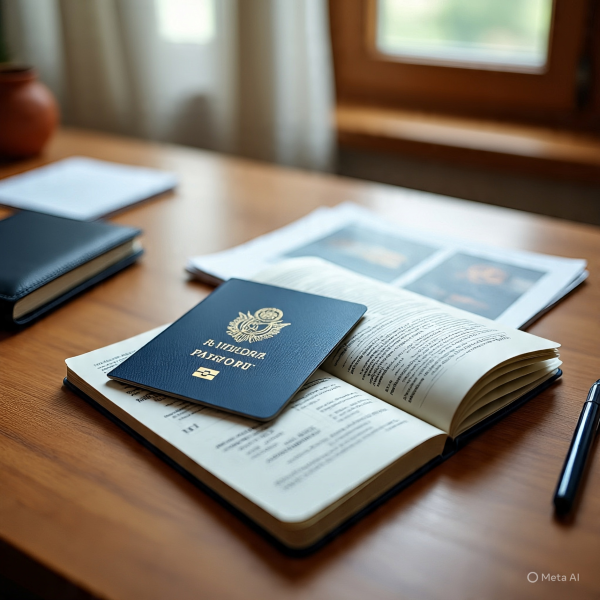Can Tech Finally End Africa’s Passport and Visa Struggles

AUTHOR: Olajide Felix of Zeal News Africa
Can Tech Finally End Africa’s Passport and Visa Struggles? National E-Passports may be the key
“It was a Sunday morning, and as usual, testimony time came with loud claps and cheers. ‘My son’s visa was approved!’ the woman declared, hands lifted in thanksgiving. The church roared, ‘Praise God!’ I smiled politely — but part of me was puzzled. When did getting permission to visit another country become a full-blown miracle?”
If you’re like me, you’ve probably wondered why so many Africans treat visa approvals like a lottery win. The answer lies in the frustrating and complicated web of passport limitations, endless paperwork, high rejection rates, and the simple but painful truth: it’s incredibly hard for Africans to move freely — even within Africa.
That single testimony reflects a wider, deeply entrenched problem across Africa: travel, especially across borders, is far from seamless. But that might be about to change. A wave of digital transformation—led by biometric IDs, e-passports, and interconnected verification systems may be the start to an end of this this narrative.
The Burden of Travel in Africa
In theory a passport is a basic right - as it proves who a person is and can be used to get a Visa that is a temporary permit into another country- but In many African countries, international travel is not just difficult; it is discouraged by the systems in place. From restrictive visa policies to low-ranking passports, mobility is limited both across the world and within the continent itself.
Latest Tech News
Decode Africa's Digital Transformation
From Startups to Fintech Hubs - We Cover It All.
African passports, generally, hold little global power. According to the Henley Passport Index, most African countries rank near the bottom, meaning their citizens require visas to visit the vast majority of the world’s nations. But more surprisingly, many African nations also require visas from citizens of fellow African countries. As of 2024, more than 50% of African states still imposed such internal restrictions, undermining the African Union’s long-standing goal of promoting continental unity and integration.
Even when visas are granted, the journey to get one is long and painful. Applicants often travel hours or even days to reach embassies, where they face long queues, high fees, endless documentation requirements, and no guarantee of success. It’s not uncommon for applicants to be denied without clear reasons, these rejections are often tied to perceptions of risk, not merit.
At the same time, the passport issuance process within several African nations remains underdeveloped. In countries where documents are still manually processed, passport applications can take months. Corruption, forgery, and bureaucratic inefficiencies plague the system, leaving citizens without valid identity or travel credentials.
Outdated Systems and a Lack of Trust
Much of the struggle can be traced to outdated systems and the lack of trusted identity verification infrastructure. Border officials in other regions often hesitate to rely on African issued documents due to concerns over forgery or inconsistent verification standards. This distrust makes it harder for African citizens to be accepted internationally, even when their documents are genuine.
Manual records and paper-based forms dominate immigration and passport services in many places, leaving room for mistakes and manipulation. In several countries, reports of multiple passports being issued to the same individual or fake documents slipping through have worsened the situation.
This poor reputation is one that undermines international trust, disrupts trade, discourages tourism, and weakens our diplomatic relations.
Can Technology Change This?
Latest Tech News
Decode Africa's Digital Transformation
From Startups to Fintech Hubs - We Cover It All.
So, now that the problem has been identified let's catch up to talk on the solutions - and Yes technology is stepping up - In recent years, Governments across the continent have begun investing in digital identity systems, introducing: Biometric verification, and electronic passports, these tools are designed not only to modernize travel documentation but to secure and streamline the entire border process.
Biometric national ID systems have already been introduced in countries like Nigeria, Ghana, Kenya, and Senegal. These systems capture individuals’ fingerprints, facial recognition data, and personal information and store them in encrypted digital databases. Once integrated with travel and immigration systems, these IDs can be used to verify a person’s identity in seconds, without paperwork, delay, or suspicion.
In Nigeria, for instance, the government has introduced a new biometric e-passport that aligns with international aviation standards. The passport contains a secure chip that stores the traveler’s biometric data and travel history. To complement the passport, Nigerian airports are being fitted with over 40 electronic gates (e-gates), which allow travelers to pass through immigration by simply scanning their passport and face, without human intervention.
Other countries are taking similar steps. Niger recently partnered with global technology firms to issue polycarbonate biometric ID cards and electronic passports. These documents are tamper-resistant, encrypted, and designed for long-term durability. With these systems put in place forgeries would go down in scale and countries would be more willing to negotiate easier visa access.
The Role of the African Union and Regional Bodies
While national projects are vital, true transformation requires continental cooperation. That’s why the African Union (AU) has taken steps to create shared frameworks that allow these technologies to work across borders.
One of the most ambitious of these is the AU’s Digital ID Framework, which encourages member states to develop interoperable digital identity systems. This would allow different national ID systems to "talk" to each other, so identity can be verified no matter where an African citizen is traveling on the continent.
In 2016, the AU also symbolically launched the African Union e-passport. Although rollout remains limited, the vision is powerful: a single, secure travel document that allows Africans to move freely across all 55 member states. The African Continental Free Trade Area (AfCFTA) and the Single African Air Transport Market (SAATM) further support this idea, by pushing for seamless trade and open skies.
Latest Tech News
Decode Africa's Digital Transformation
From Startups to Fintech Hubs - We Cover It All.
If fully realized, these projects would create an environment similar to the Schengen Area in Europe, where citizens can travel across borders using one unified visa or travel document. This would radically improve business, tourism, and cultural exchange across the continent.
The Gaps Still Holding Back Progress
Despite the momentum, major challenges remain. Digital infrastructure is uneven across Africa, with many countries lacking the broadband access and technological capacity to roll out these systems at scale. Electricity shortages, low internet penetration, and poor institutional funding make it hard to build the digital backbone needed for secure ID systems.
There are also serious concerns about data privacy. As biometric and personal data begins to move across borders, clear legal frameworks are needed to ensure that citizens’ information is protected from misuse or exploitation. Without trust in these systems, public adoption may stall, undermining the progress made.
Additionally, political will and regional cooperation are not always aligned. Some governments are eager to push ahead, while others remain cautious. For digital identity to truly enable cross-border travel, all participating nations must agree on shared standards, enforcement mechanisms, and mutual recognition of documents.
A Future Where Travel Is a Right, Not a Privilege
Still, there is reason for optimism. The pace of innovation is accelerating, and many African countries are proving that technology can be used not only for modern convenience but for deep, structural change.
The testimonies may still come, and the visa stories may still draw applause. But there is now a path toward a different future, one where the right to move, to study abroad, to attend a conference, or to explore a neighboring country, is no longer determined by luck or privilege, but by access to secure, recognized, and modern identity tools.
Latest Tech News
Decode Africa's Digital Transformation
From Startups to Fintech Hubs - We Cover It All.
Obviously technology will not curb every border. But it would build the international trust needed that could make those borders fairer, safer, and more accessible not just within the continent but abroad as well. And that may be the first true miracle in African mobility in decades.
AUTHOR: Olajide Felix of Zeal News Africa
You may also like...
Bundesliga's New Nigerian Star Shines: Ogundu's Explosive Augsburg Debut!

Nigerian players experienced a weekend of mixed results in the German Bundesliga's 23rd match day. Uchenna Ogundu enjoye...
Capello Unleashes Juventus' Secret Weapon Against Osimhen in UCL Showdown!

Juventus faces an uphill battle against Galatasaray in the UEFA Champions League Round of 16 second leg, needing to over...
Berlinale Shocker: 'Yellow Letters' Takes Golden Bear, 'AnyMart' Director Debuts!

The Berlin Film Festival honored
Shocking Trend: Sudan's 'Lion Cubs' – Child Soldiers Going Viral on TikTok

A joint investigation reveals that child soldiers, dubbed 'lion cubs,' have become viral sensations on TikTok and other ...
Gregory Maqoma's 'Genesis': A Powerful Artistic Call for Healing in South Africa

Gregory Maqoma's new dance-opera, "Genesis: The Beginning and End of Time," has premiered in Cape Town, offering a capti...
Massive Rivian 2026.03 Update Boosts R1 Performance and Utility!

Rivian's latest software update, 2026.03, brings substantial enhancements to its R1S SUV and R1T pickup, broadening perf...
Bitcoin's Dire 29% Drop: VanEck Signals Seller Exhaustion Amid Market Carnage!

Bitcoin has suffered a sharp 29% price drop, but a VanEck report suggests seller exhaustion and a potential market botto...
Crypto Titans Shake-Up: Ripple & Deutsche Bank Partner, XRP Dips, CZ's UAE Bitcoin Mining Role Revealed!

Deutsche Bank is set to adopt Ripple's technology for faster, cheaper cross-border payments, marking a significant insti...






